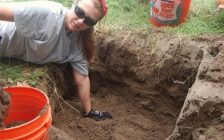University of Indianapolis faculty highlight migrant death crisis in new book


A unique new book by University of Indianapolis faculty sheds light on the migrant death crisis in the Texas Borderlands by discussing the circumstances that force people to flee their home countries to seek refuge in the United States – despite the perilous journey. The book also explores the reasons why migrant deaths have reached mass disaster proportions and the techniques employed by forensic scientists to locate and identify the dead.
“Sociopolitics of Migrant Death and Repatriation: Perspectives from Forensic Science” by Krista Latham, associate professor of biology and anthropology, and Alyson O’Daniel, assistant professor of anthropology, explores the migrant death crisis at the U.S. southern border, along with the forensic techniques utilized in this humanitarian crisis. The book focuses on situating the migrant death crisis and response within a broader sociopolitical framework by highlighting the challenges faced by forensic scientists working in this context and the techniques used by cultural anthropologists to contextualize the crisis.
“Sociopolitics of Migrant Death and Repatriation” includes chapters written by experts actively working on these issues and discusses how historically-driven conditions of social inequality, resource allocation and policy implementation have contributed to the crisis unfolding along the border today. Latham and O’Daniel organized a symposium based on the book at the 37th Annual Mountain, Desert & Coastal Forensic Anthropologists Meeting in 2017, where the work of ten of the contributing authors was presented and discussed.
“The main focus of the book is to better understand the crisis and the forensic science response as shaped and constrained by broad, systems-level processes of power,” said Latham, who also serves as the director of the University of Indianapolis Human Identification Center.
Latham’s work has brought national attention to the humanitarian crisis happening at the border. Latham and her graduate students on the University of Indianapolis Forensics Team have been working to uncover remains from unmarked grave sites and identify the bodies of those who have died while making the journey to the United States since 2013. In 2017, five Human Biology graduate students, two Anthropology undergraduate students and colleague O’Daniel traveled to Texas with Latham to participate in the project, and in January 2018, she will return to the area with another group of graduate students. (Read more about the project here.)
“Sociopolitics of Migrant Death and Repatriation” introduces readers to some of the forensic science techniques utilized in the migrant identifications, including forensic archaeology to recover the bodies and DNA analysis as a means of positive identification, among other techniques.
“Our authors together have traced how global and local political economic relationships shape what happens to marginalized migrants in life and in death. The picture that emerges is profoundly troubling, but it is not without hope and not without dedicated individuals who are indeed taking action,” O’Daniel said.
In restoring the names and memories of migrants whose identities would otherwise be unknown, Latham said the goal is to create a record that one day will work toward change and social justice.
“As professionals in forensic science, we are able to tell stories and document inequalities that may otherwise go unheard and unnoticed by the vast majority of Americans,” Latham said. “We see the imprints of lifelong poverty on their bones and teeth. We see the love they have for their families in the photos and notes recovered in their pockets. We document the places they die and bear witness to the fact that these deaths are happening in staggering numbers.”
Follow Latham’s work in Texas here.
